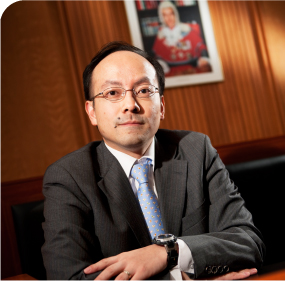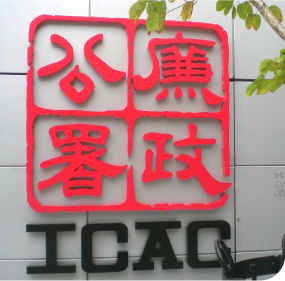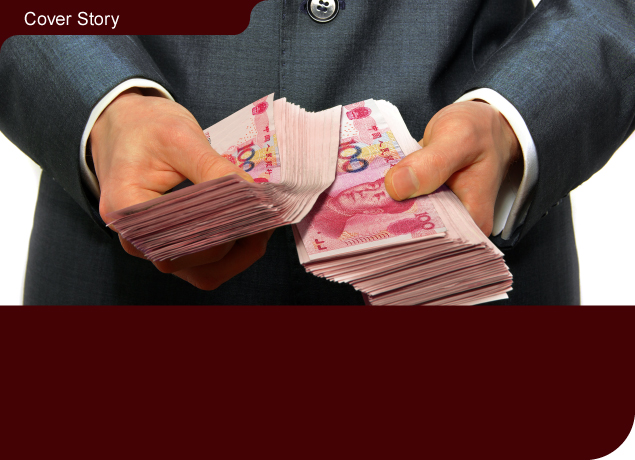Hong Kong is home to one of the world’s leading anti-corruption agencies, the Independent Commission Against Corruption (ICAC), which celebrates its 40ᵗʰ anniversary this year. Despite that, the city is likely exporting about HK$30 billion in corruption to developing countries, mainly Mainland China, each year.
That is the finding of Dr Bryane Michael, former Columbia University Professor and currently a Senior Research Assistant in the Department of Law, who has advised 27 countries on anti-corruption measures and who has been looking at how Hong Kong compares to the rest of the world.
“The ICAC is a gold standard anti-corruption agency,” he said, “but I was surprised at how far it has fallen behind even some African countries on things like the criminalisation of foreign bribery, corporate corruption and code of conduct programmes. Hong Kong was at the vanguard until the 1990s but it has become complacent.”
A major limitation in fighting corruption here is that conspiring to bribe foreign officials or foreign public corporations is not outlawed, even when this can benefit a Hong Kong company – a finding that the Hong Kong Court of Final Appeal confirmed in August this year. This, combined with intense cross-border economic activity and the prevalence of bribery as a way of doing business in China, means “Hong Kong companies seeking to engage in bribery can do so relatively easily on the Mainland,” Dr Michael said.
A clue to the extent of such activity comes from Hong Kong’s trading partners. The largest investment partner is China but the next two largest – British Virgin Islands and Bermuda – are tax and money-laundering havens.
“The pattern of Hong Kong’s foreign direct investment suggests that its trade with China represents part of a larger system of corrupt payments and money-laundering,” he said.
The pattern of Hong Kong’s foreign direct investment suggests that its trade with China represents part of a larger system of corrupt payments and money-laundering.
Dr Bryane MichaelCorporate indifference
There are straightforward solutions to this problem, in particular amending the law to address cross-border corruption, which Dr Michael estimated could reduce bribery exports by HK$5 to HK$20 billion and increase Hong Kong Government revenue by HK$200 billion. But at the same time, there are hurdles to overcome.
One is the willingness of companies to reduce corruption. Hong Kong ranks near the bottom of Transparency International’s scorecard for jurisdictions with corporations that implement anti-corruption measures. Companies here are not required to practise self-policing or adopt anti-corruption policies and programmes, and whistleblowers are not protected by law. Dr Michael recommends more explicit laws and incentive measures to encourage companies to give priority to reducing corruption.
Another major hurdle is the ICAC itself. Professor Simon Young, who has traced the historical development of the agency since its founding in 1974, describes it as being in the throes of a crisis of confidence.
 Professor Simon Young studies the historical development of the Independent Commission Against Corruption (ICAC).
Professor Simon Young studies the historical development of the Independent Commission Against Corruption (ICAC).
 This year marks the 40ᵗʰ anniversary of the ICAC but its integrity has been questioned and its power relatively weakened.
This year marks the 40ᵗʰ anniversary of the ICAC but its integrity has been questioned and its power relatively weakened.
ICAC under a cloud
“In the initial heyday of the 1970s and 1980s, the ICAC was really fearless and had enormous amounts of power. It was very effective in bringing about an end to public corruption, at least compared to the state it was in before,” he said.
But the enactment of the Hong Kong Bill of Rights Ordinance in 1991 and the Basic Law in 1997 introduced safeguards that placed curbs on the ICAC’s powers.
“These developments, together with increasing public demand for accountability and better governance, have put a lot of pressure on the ICAC,” Professor Young said. “Although it remains independent, there’s a lot more scrutiny of its practices, particularly its operational practices. Its integrity has been questioned.”
A recent Legislative Council investigation into lavish spending by former ICAC Commissioner Timothy Tong Hin-ming has contributed to the sense that the agency is losing its way.
Professor Young believes stronger and clearer laws, more focus on corruption by private firms and better human rights education of operational staff are needed. “They shouldn’t think they are invincible or untouchable,” he said. “They have to recognise that the times have changed, and think about how they can be effective in this climate.”
Time to look across borders
Strengthening the ICAC’s hand could also help the organisation to sustain its high regard in a world where crime, like everything else, has become globalised. In fact, Dr Michael’s main interest in looking at corruption in Hong Kong in the first place was to place it in the bigger context of international anti-corruption practices, particularly across borders.
“Within a country like the United States, we understand how Nebraska and California police deal with each other. What happens when Hong Kong and Mainland police work together on something that is almost impossible to assess, which is corruption?” he said.
Such cooperation has yet to emerge here, at least on transparent and formal terms, although countries such as the United States are actively pursuing corruption cases involving their citizens in China. Hong Kong needs to act, too, or its armoury for fighting corruption will remain incomplete.■
A prize-winning survey on young people’s integrity
Questionable ethics and integrity can extend onto university campuses, too. A team of HKU undergraduate students surveyed 100 young people aged 16 to 25 and found 98 per cent downloaded music illegally, 86 per cent used pirated software, 82 per cent had made up data in their work, and 73 per cent had plagiarised or copied, among other transgressions. The project – by Shirley Yung Ho-yee (Social Sciences, Year 1) and Derek Wong Chun-ki and Larry Lai Fu-wai (both Science, Year 3) – won the Gold Award and Best Presentation Award in a competition organised by the ICAC on youth ethics and integrity. The students recommended that young people should be encouraged to think twice before acting, ask themselves whether they would be comfortable with others knowing what they are doing, and be more attentive to moral values.


